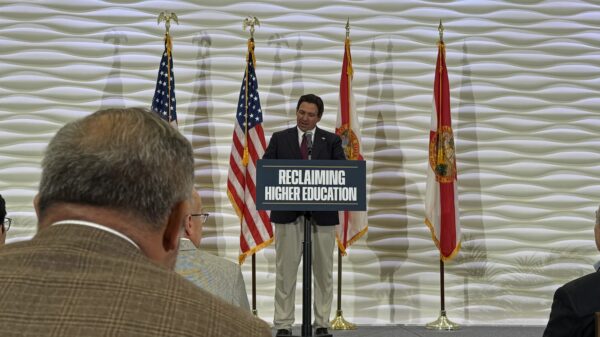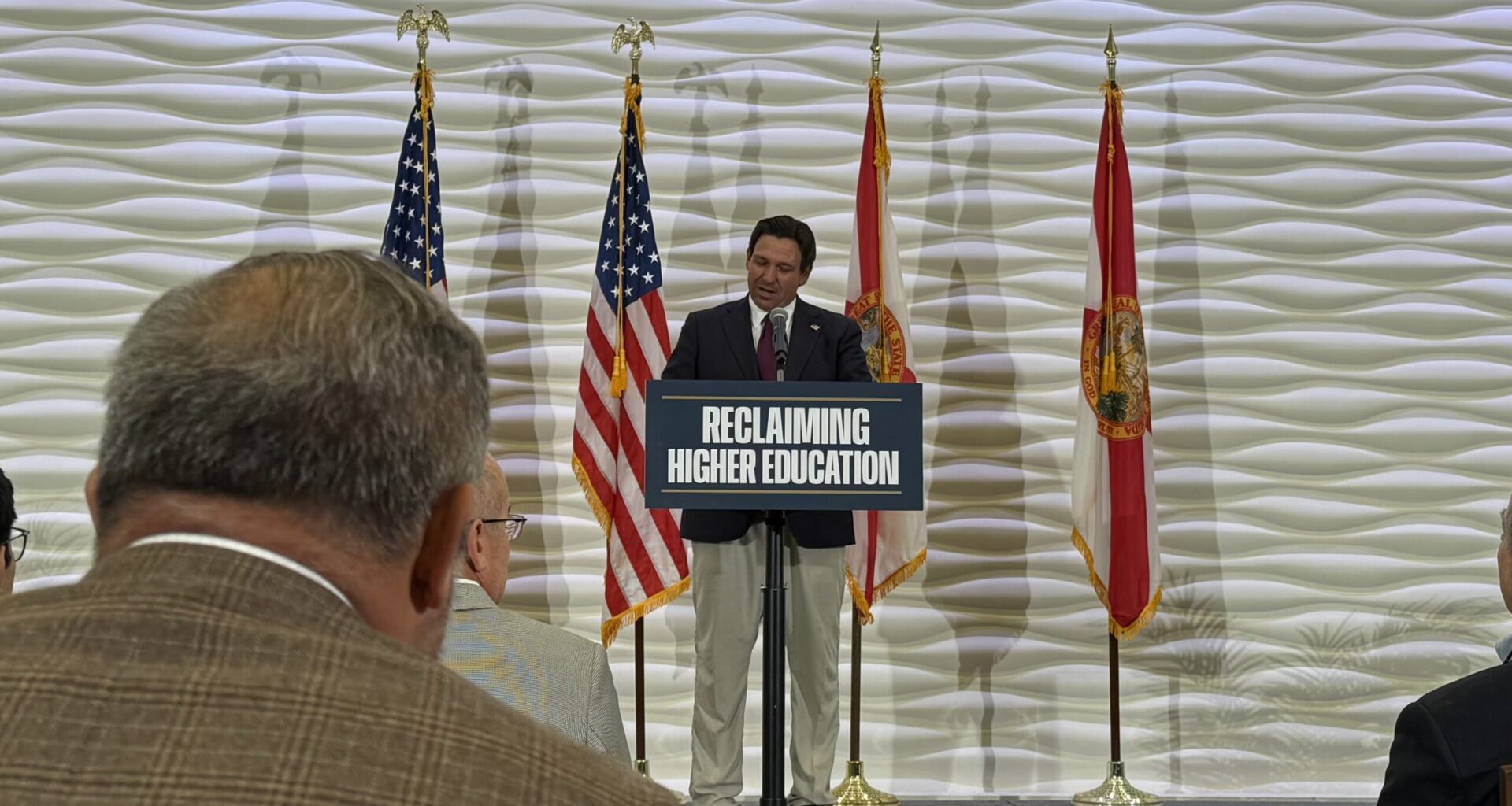 Governor Ron DeSantis held a press conference at the Sam and Martha Gibbons Alumni Center on Wednesday morning. ORACLE PHOTO/CLARA ROKITA GARCIA
Governor Ron DeSantis held a press conference at the Sam and Martha Gibbons Alumni Center on Wednesday morning. ORACLE PHOTO/CLARA ROKITA GARCIA
Governor Ron DeSantis outlined what the Florida State Department of Governmental Efficiency found in its review of public universities at a USF press conference on Wednesday morning.
DeSantis announced the creation of the Florida DOGE in February, following the establishment of the Federal DOGE in January, to eliminate “inefficiencies” across state agencies and higher education institutions.
Florida Division of Bond Finance Director Ben Watkins said the Florida DOGE enabled the state to evaluate how universities operate financially.
“It’s DEI of a different flavor — DeSantis Efficiency Initiative,” Watkins said.
Watkins said the Florida DOGE will present formal findings — gathered since its creation — to the Board of Governors during its next meeting on Nov. 6
Until then, DeSantis previewed key findings — such as the ongoing review of tenured professors, curriculum, grants and student conduct, alongside the crackdown on H-1B visa use at universities.
Related: USF assembles DOGE task force to dig up ‘unnecessary’ spending
H-1B visas
DeSantis said he is directing the BOG to “pull the plug” on the use of H-1B visas in state universities.
H-1B visas apply to “nonimmigrant” workers in an occupation that requires “highly specialized” knowledge and a bachelor’s degree, according to the U.S. Department of Labor.
DeSantis said companies tend to think Americans “aren’t willing” to do specialized work — and end up hiring people from other countries at a discount.
But he said universities should have the capacity to “produce” Americans who are qualified for such positions.
After reviewing staff at state universities, DeSantis said he found an assistant professor from China, a bioanalytical core director from Poland, a psychologist from the United Kingdom, a graphic designer from Canada and more.
“Why do we need to bring someone from China to talk about public policy?” he said. “An assistant swim coach from Spain on an H1-B visa? Are you kidding me? We can’t produce an assistant swim coach in this country?”
Related: USF international students are among those losing visas
DeSantis said the idea that only “someone from those places” is qualified or knowledgeable enough to work high-paying jobs is “an abuse.”
“We need to make sure our citizens here in Florida are first in line for job opportunities,” he said.
As of June, USF had employed 72 H1-B visa holders during the 2025 fiscal year — ranking third among all Florida universities — just behind the University of Florida and University of Miami, according to the U.S. Citizenship and Immigration Services.
And while UF leads state universities in H1-B visa employees, the university’s Interim President Donald Landry — who was present at the event — said he “endorses” the review of those visas.
“Occasionally, some bright light might be good enough, in fact, and then we will try and retain the person,” he said. “But that’s kind of the exception of truth.”
Tenured professors
DeSantis said all tenured professors must undergo review every five years and can be laid off based on their performance.
He said many “unproductive” professors have already been terminated over the last couple of years — but the government also gave universities money to bring in new faculty.
The USF Health Morsani College of Medicine was ranked the top medical school in Florida this April, according to U.S. News and World Report.
DeSantis said USF’s ranking is important because medicine went “totally off the rails” in some schools, like Columbia University — which he said had a “woke” Hippocratic Oath.
Incoming students of Columbia’s Vagelos College of Physicians and Surgeons read an updated oath during a 2021 White Coat Ceremony —with a commitment to “acknowledge and embrace the diversity that exists within all communities,” according to the school’s website.
Related: USF Health Morsani College of Medicine is ranked best in the state
This September, the Center for Accountability in Medicine at Do No Harm ranked medical schools based on “academic excellence, transparency and rejection of DEI.”
USF’s Morsani College of Medicine scored the top spot, according to Do No Harm.
USF’s approach to medicine has been “great,” DeSantis said, because the university is focusing on evidence and facts versus DEI initiatives.
DeSantis said the state has been working to identify university funds being used on “woke grants” — and $33 million has already been saved or repurposed overall.
Curriculum, grants and behavior
DeSantis said the state has also ensured that university curricula are in “good order.”
When DeSantis became governor in 2019, college students were required to take a sociology class. But last year, the BOG removed sociology from the general education requirements.
“There was a lot of hooting and hollering about that, and I think the reason is because sociology is one of those ways where they can use that to smuggle in the ideology,” he said.
Related: USF replaced sociology as a gen ed requirement. What does that mean for students?
DeSantis said the state has also upheld a commitment to “good behavior, law and order” on university campuses, which he said were previously letting “the inmates run the asylum.”
“You can have views and express views, but the minute your conduct contravenes university expectations or regulations, you need to be held accountable,” he said.
On April 30, 2023, law enforcement broke up a pro-Palestine encampment at USF using tear gas, and some USF students were suspended or expelled following the demonstration.
At the time, USF Police Chief Chris Daniel said the university “cherishes” free speech rights — as long as they happen in “accordance with university policy,” according to an Oracle article.
“We’ve seen students whose conduct was outside of what was acceptable be held accountable throughout our university system,” DeSantis said. “The result has been you didn’t see our university campuses turn into little Columbia.”
Related: USF students join ‘No Kings’ protest opposing Trump administration policies
How the audit works
Watkins said DOGE’s review uses universities’ financial statements, student data and personnel information to calculate ratios or performance metrics related to productivity.
“[The review] is not rocket science,” Watkins said. “It can be easily done and should be done.”
Watkins said that performing the efficiency study provides “radical” transparency into how universities use the nearly $4 billion in state funds invested in them each year.
DeSantis said the study found many “positives” but identified areas for improvement.
“We’ve worked very hard at making sure these institutions are focused on the traditional mission of what a university should be doing — that they’re pursuing truth, not trying to propose ideology, that they have high standards that were elevating merit over some of these ideological fads,” he said.

